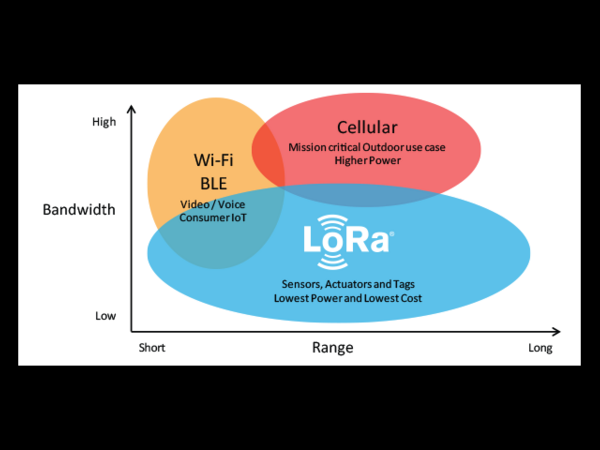
LORA Smart Cities Test: ASU Skysong Innovation Campus
The ASU CIC collaborated to envison and stand-up a smart cities test-bed using a LoRa network on the ASU Skysong Innovation Campus in Scottsdale. A test-bed is a cost-effective way to model smart city development and develop and test digital solutions in an ethical, inclusive and secure way before scaling them across cities. IoT solutions are implemented on a smaller scale so that set-up procedures and performance issues can be refined and documented. This reduces risks and improves outcomes in scaled deployments.
At the Skysong campus, the ASU CIC began building based on the LoRa communications typology. LoRa - short for long range is idea for connecting IoT devices. LoRa uses low power, can cover a large area, is low cost and is secure. All of these are favorable when trying to connect lots of sensors.
For the test bed, several LoRa gateways were installed throughout SkySong and the range and capacity was tested to better understand how ASU and regional communities can leverage this technology for deploying smart city solutions at scale.
Problem
Smart Cities Proofs of Concept (POC) are essential collaborations between governments and vendors for the development and use of smart cities solutions. POC's with IoT devices are challenges for a number of reasons including access to communications networks, power, places to deploy gear and a clear understanding of how the POC will run. All of these challenges can be barriers to the testing of solutions that impede a governments ability to innovation by experimenting, evalute proposals and get the information they need to make informed decision on solutions.
Approach
The Test-Bed was designed to remove barriers to testing smart cities IoT solutions. By creating a LoRa network, fixed places to deploy devices and a playbook, regional communities and ASU now have a safe, standing environment to test smart cities solutions.
Because LoRa devices use little power, they can be powered with long-life batteries and do not need to be hard-wired to electric service. Becuase LoRa devices only transmit small amounts of data, they do not require expensive cellular fees.
Connecting and managing devices on a LoRa network is also easy to do and can be self-provisioned without the need to engage a 3rd party.
The ASU Skysong Campus covers 42 acres and include 1.2 million square feet in mixed use facilities. The Campus provides the perfect setting for a test-bed and a favorable environment for deploying sensors and exploring smart cities use-cases.
Supporting Artifacts
In support of the Test-Bed, the CIC is producing a playbook, sensor lists and other materials to guide the development and managment of future LoRa deployments.
Next Steps
With the LoRa network deployed, the CIC has produced a Test-Bed Playbook to guide others in standing up and operating a LoRa network. The CIC is also experimenting with connecting different types of sensors, network range and how to access and use sensor data. Currently, the CIC is installing new gateways to further develop the LoRa network.
About the ASU CIC
The ASU Smart Cities Cloud Innovation Center (CIC) is a strategic relationship with Amazon Web Services (AWS) and is supported by AWS on ASU’s Innovation campus - SkySong. The mission of the CIC is to drive Innovation Challenges that materially benefit the greater Phoenix metro area and beyond. The CIC will do this by solving pressing community and regional challenges, using shareable and repeatable technology solutions from ideation through prototype, as a service for the greater human good.
The CIC also provides real-world problem-solving experiences to students by immersing them in the application of proven innovation methods in combination with the latest technologies to solve important challenges in the public sector.
The challenges being addressed cover a wide variety of topics including homelessness, water conservation, vandalism, pedestrian safety, digital service delivery and many others. The CIC leverages the deep subject matter expertise of government, education and non-profit organizations to clearly understand the customers affected by public sector challenges and develops solutions that meet the customer needs.
For more information on the ASU CIC, to read about projects or to submit a challenge, please visit https://smartchallenges.asu.edu.
Photos
